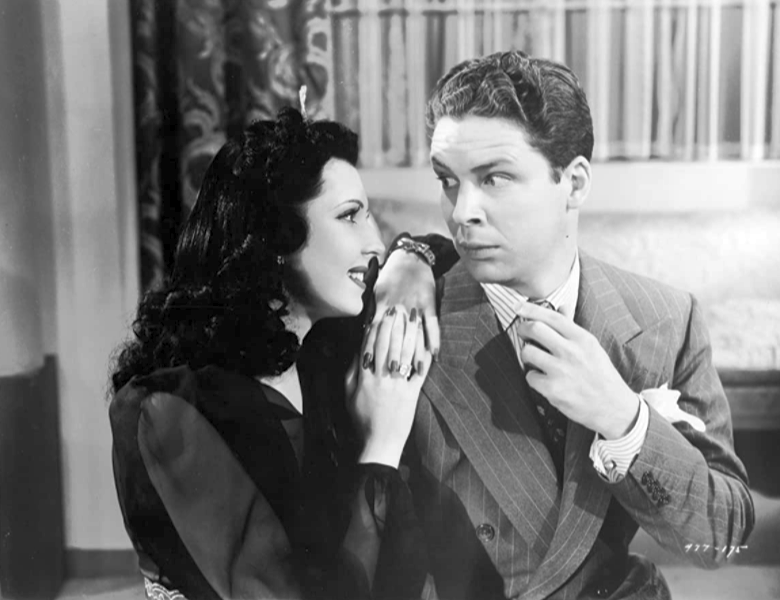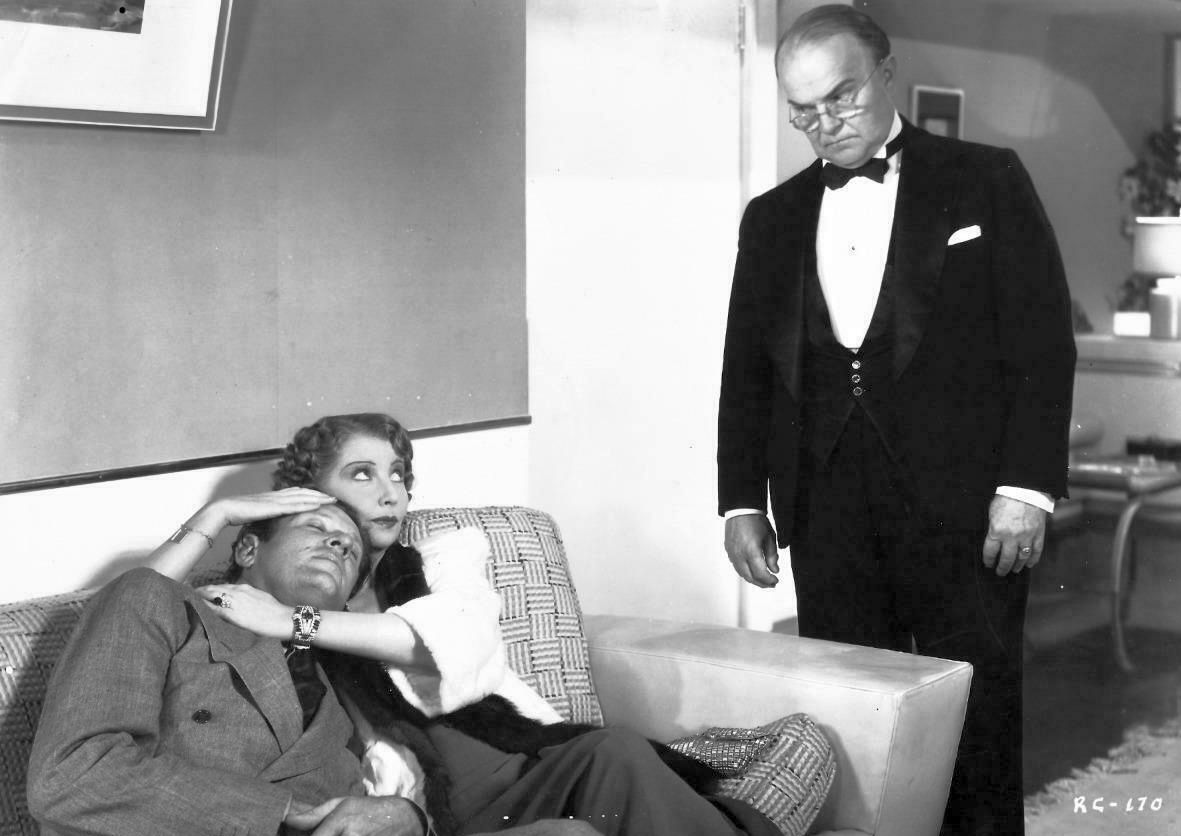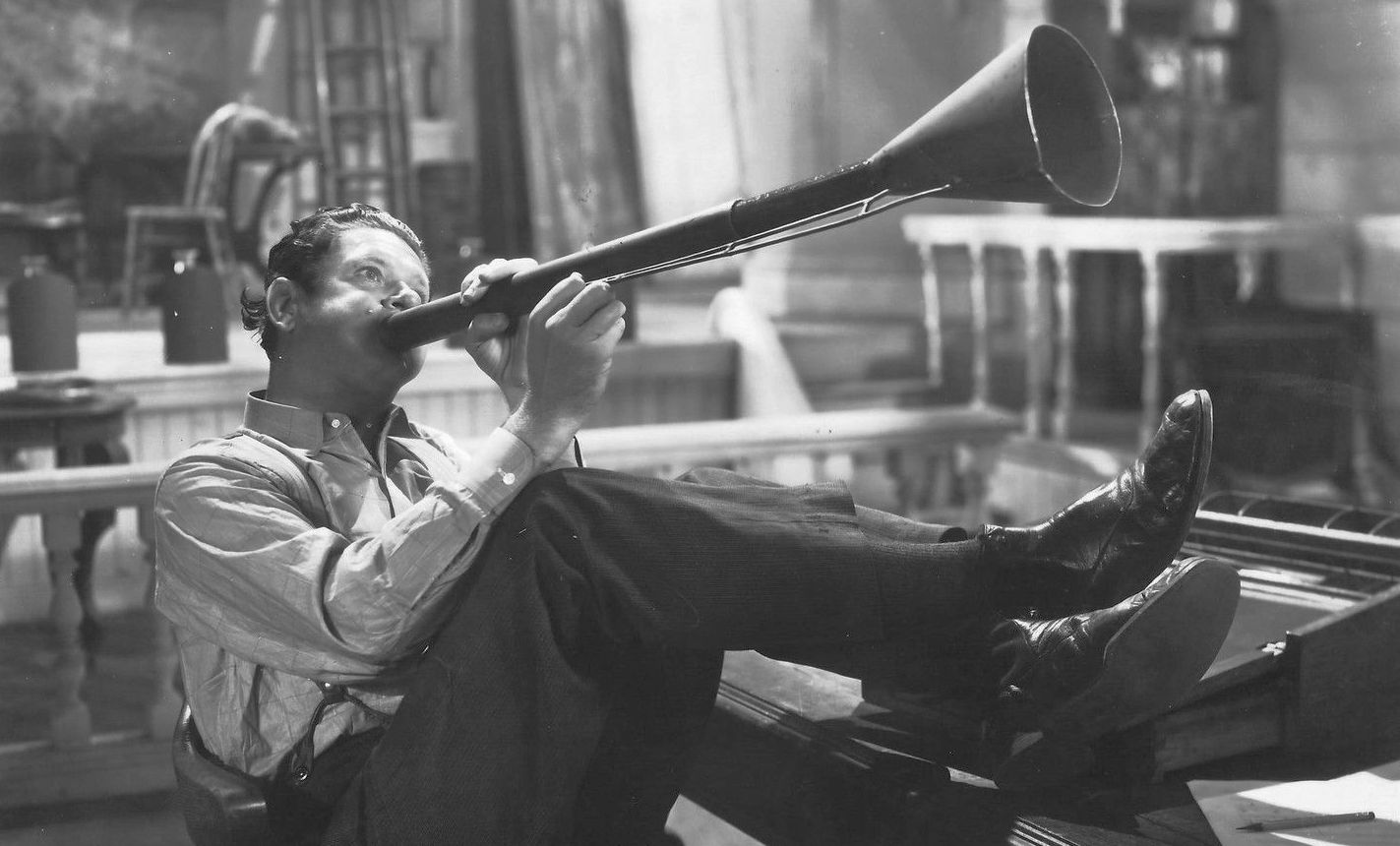Review: Radio City Revels (1938)
Posted by Ivan G. Shreve, Jr. on May 9th 2014
Aspiring songwriter Harry Miller (Jack Oakie) is long on ambition…and short on talent. With his piano-playing partner Teddy Jordan (Milton Berle), Harry is barely making the rent on the apartment they share in NYC—their main source of income derives from the mail-order songwriting “lessons” they send to Van Buren, Arkansas native Lester Robin (Bob Burns) every week. Harry has dreams of promoting tap dancer Billie Shaw (Ann Miller) to the big time, despite an enormous amount of skepticism from her acid-tongued sister Gertie (Helen Broderick).
Lester makes the trek to the Big Apple, determined to finish his songwriting training. Harry and Teddy are ready to give him the bum’s rush once they determine that their student has no money (he lost his wallet somewhere between Van Buren and NYC)—but have a change of heart when Lester reveals a knack for writing hit tunes in his sleep. Robin’s nocturnal efforts like “Take a Tip from the Tulip” and “Good Night, Angel” become quite popular. However, Harry has taken credit for the compositions, keeping their true origins a secret from producer Paul Plummer (Victor Moore). When he’s not “sleep songwriting,” Lester is making goo-goo eyes at Billie…who’s fallen in love with singer Kenny Baker (playing himself).
In the meantime, sister Gertie has set her cap for Lester and discovers that it is he, not Harry, with the songwriting talent. She eventually spills the beans to Plummer, who’s just handed a large check to Harry upon completing the score to a stage musical, Radio City Revels. Harry has a change of heart about the deception; he lets Lester and Gertie have the check, and wedding bells are in the future for them (as well as for Billie and Kenny) as the proceedings come to a close.

Radio City Revels (1938) is not a great musical comedy, but it is an interesting one: originally conceived as a Fred Astaire-Ginger Rogers musical, it’s burdened by over length (at ninety minutes it could have used some trimming) and some mediocre songs that you probably won’t wind up humming any time soon. Four writers worked on Revels (from a story by Matt Brooks) including Anthony Veiller, who later collaborated with director John Huston on films like Moulin Rouge and The List of Adrian Messenger. The directing chores were handled by Ben Stoloff, who helmed a number of B-pictures and shorts for RKO in the 1930s.
Stoloff had worked with Revels star Jack Oakie on two previous films, Fight for Your Lady and Super Sleuth, and would again on a fourth film the following year, The Affairs of Annabel. Oakie is in his element here as a lovably obnoxious sort whose larceny is undercut by a kind heart and a genuinely altruistic drive to help Ann Miller’s Billie experience stardom. Jack was a major motion picture star in the 1930s (appearing in a number of hit Paramount musicals including College Humor and The Big Broadcast of 1936) but was also a headliner on radio’s The Camel Caravan from 1936 to 1938 (also known as Jack Oakie’s College). Oakie continued his extensive work in musicals at 20th Century Fox in the 1940s with vehicles like Tin Pan Alley and Hello Frisco, Hello.
Co-starring with Oakie and Miller is comedian-musician Bob Burns…who is appropriately introduced in Revels playing his “bazooka”—a novelty instrument that consisted of a funnel and a gas pipe, played in the manner of a slide trombone. (The name would later be appropriated by the U.S. Army for their handheld anti-tank rocket launcher.) Burns was no stranger to movies at this time: he appeared in vehicles like Rhythm on the Range and Waikiki Wedding alongside the Old Groaner himself, Bing Crosby. Bob, who began his radio career on a number of local shows before getting his break on Rudy Vallee’s popular variety hour, was the comedian-in-residence on Der Bingle’s The Kraft Music Hall from 1936 to 1941 (Bob kids his boss in Revels by having his character murmur “boo-boo-boo-boo” just before he starts sleep composing). He then moved out on his own with a self-titled series heard on CBS and NBC (for such sponsors as Campbell Soup and Lifebuoy) from 1941-47. The Bob Burns Show (also known as The Arkansas Traveler, one of Burns’ many nicknames) featured such performers as vocalist Ginny Simms, character actress Edna May Oliver, Bowery Boy Leo Gorcey and Spike Jones & His City Slickers.

At the time of Radio City Revels’ release, tenor Kenny Baker was the featured vocalist on The Jack Benny Program. Baker was a regular on the show from 1935-39, leaving to work for Benny’s feuding partner, Fred Allen, from 1940 to 1942. In 1946, he headlined the daytime variety program Glamour Manor. On Manor, Kenny was reunited with Jack Benny’s announcer Don Wilson, who was also a regular. “Donsy” is along for the ride here in Revels, appearing in the opening scenes as the announcer who introduces Baker’s rendition of “Taking a Shine to You.”
Radio City Revels marks the final screen teaming of Victor Moore and Helen Broderick (they appeared in a total of six RKO films, notably 1936’s Swing Time) although their characters aren’t romantically linked (Broderick chases after Bob Burns). Old-time radio fans know that Moore later appeared as a regular on the Edgar Bergen-Charlie McCarthy and Jimmy Durante shows. Other familiar names appearing in Revels include Richard Lane (Inspector Farraday in the Boston Blackie movies) and comic dancers Buster West and Melissa Mason (who could give Charlotte Greenwood competition in the “high kicks” department). A young Jane Froman is also on hand (Jane and Kenny were regulars on radio’s The Texaco Star Theatre at the time) to sing a few of the movie’s tunes, accompanied by Hal Kemp and His Orchestra.

Radio City Revels is scheduled to air on Turner Classic Movies this May 21st at 8:30am EDT, and the cast alone makes it worth a look-see. You can check out some of the Revels stars on Radio Spirits collections: Don Wilson is a permanent presence on our Jack Benny sets while Kenny Baker is featured in the early years (Oh, Rochester!) as well as Jack Benny vs. Fred Allen: The Feud. Milton Berle guest stars on a 1943 Duffy’s Tavern broadcast available on Where the Elite Meet to Eat and sets like The Voices of Christmas Past spotlight his 1947-48 NBC radio series. You’ll also enjoy the hilarity of Victor Moore on Edgar Bergen & Charlie McCarthy: Homefront Charlie and the song stylings of Jane Froman (You Make Me Feel So Young) and Hal Kemp (Decade of Hits: The 1930s, 75 Happy Hits: Zing! Went the Strings of My Heart) on our music CDs, too!

